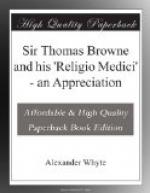ON THE HOLY SCRIPTURES
Such I do believe the holy Scriptures; yet were it of man, I could not choose but say, it was the singularest, and superlative piece that hath been extant since the creation; were I a Pagan, I should not refrain the lecture of it, and cannot but commend the judgment of Ptolemy, that thought not his library complete without it. The Alcoran of the Turks (I speak without prejudice) is an ill-composed piece, containing in it vain and ridiculous errors in philosophy, impossibilities, fictions, and vanities beyond laughter, maintained by evident and open sophisms, the policy of ignorance, deposition of universities, and banishment of learning, that hath gotten foot by arms and violence; this, without a blow, hath disseminated itself through the whole earth. It is not unremarkable what Philo first observed, that the law of Moses continued two thousand years without the least alteration; whereas, we see the laws of other commonwealths do alter with occasions; and even those that pretend their original from some divinity, to have vanished without trace or memory. I believe, besides Zoroaster, there were divers that wrote before Moses, who, notwithstanding, have suffered the common fate of time. Men’s works have an age like themselves, and though they outlive their authors, yet have they a stint and period to their duration. This only is a work too hard for the teeth of time, and cannot perish but in the general flames, when all things shall confess their ashes.
Rest not in the high-strained paradoxes of old philosophy, supported by naked reason, and the reward of mortal felicity; but labour in the ethics of faith, built upon heavenly assistance, and the happiness of both beings. Understand the rules, but swear not unto the doctrines of Zeno or Epicurus. Look beyond Antonius, and terminate not thy morals in Seneca or Epictetus. Let not the twelve but the two tables be thy law: let Pythagoras be thy remembrancer, not thy textuary and final instructor: and learn the vanity of the world, rather from Solomon than Phocylydes. Sleep not in the dogmas of the Peripatus, Academy, or Porticus. Be a moralist of the mount, an Epictetus in the faith, and christianise thy notions.




